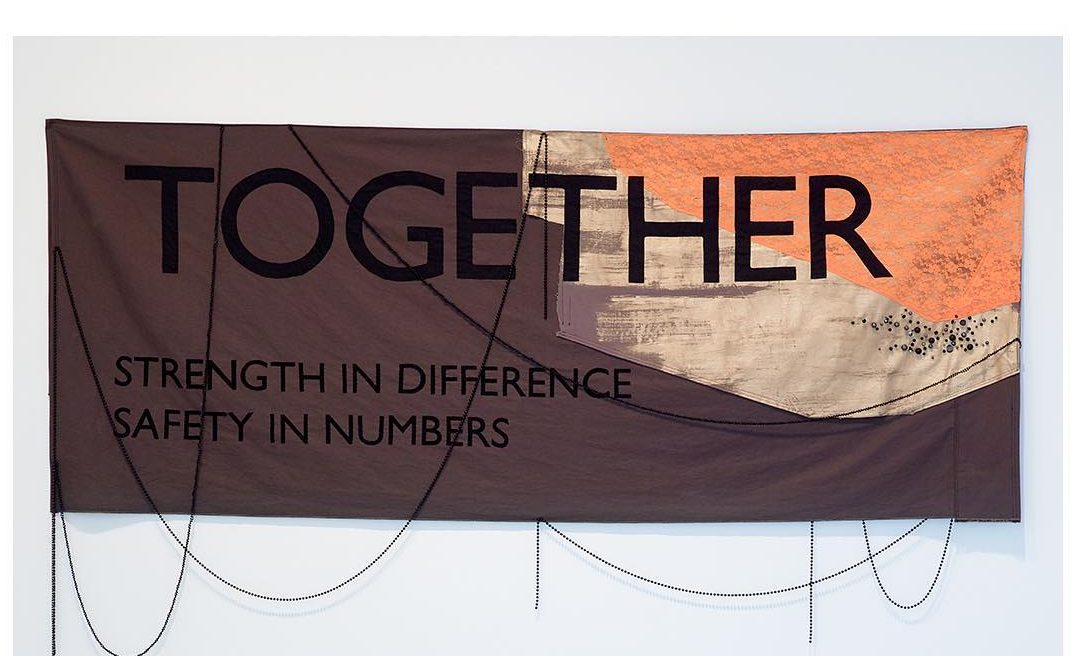banner image: Tuesday Smillie, Together, 2017
All readings should be completed prior to class.
We will often move backward and forward in time as we work through trajectories of feminist conflict, which means you are responsible for attending to dates of publication and considering which ideas authors may or may not have had access to. Pay attention to other contexts too: academic discipline, activist commitment, authorial voice.
There is a lot of assigned reading for this class: far too much for you to finish the day before each of our weekly seminars. Start your reading early in the week and read ahead as much as you can. When we read denser, more theoretical texts, you might find this essay by Kyla Wazana Tompkins to be useful inspiration: “We Aren’t Here to Learn What We Already Know.”
Where readings are archived in spaces that require institutional access, links will take you directly to an authentication page where you can log in with your UMD ID. Installing this browser button may speed up your off-campus access. If you are using this syllabus for individual study and cannot access the texts, contact me (alothian at umd dot edu) and I will happily share files with you. If you are able to use institutional journal subscriptions, though, please do, as this helps authors to see that they are being read as well as supporting the work of journals and libraries in publishing and disseminating feminist and queer scholarship.
Unit 1: Social Justice Feelings
Week 1: Thursday January 31
Setting Intentions and Collective World-Making
Complete confidential questionnaire before class if possible. If you join class late, complete it as soon as you can.
By Monday February 4:
Opening reflection due.
Week 2: Thursday February 7
Mobilizing
• Sara Ahmed, “Feminism is Sensational” and “A Killjoy Manifesto” from Living a Feminist Life (2016)
• Audre Lorde, “The Uses of Anger” (1981) and “Learning from the 60s” (1982)
• Deborah M. Gould, “The Emotion Work of Movements” from Moving Politics: Emotion and ACT UP’s Fight Against AIDS (2009)
Week 3: Thursday February 14
Fracturing
• Jo Freeman, “Trashing: The Dark Side of Sisterhood” (1976) and “The Tyranny of Structurelessness” (1972)
• Bernice Johnson Reagon, “Coalition Politics: Turning the Century” (1981)
• Deborah M. Gould, “Solidarity and its Fracturing” from Moving Politics: Emotion and ACT UP’s Fight Against AIDS (2009)
• Grace Kyungwon Hong, “Solidarity and Strife: Third-World Feminists in Conflict” (2016; distributed as hard copy)
Discussion of Reagon led by Stella
Week 4: Thursday February 21
Institutionalizing
• Marilyn Boxer, “For and about Women: The Theory and Practice of Women’s Studies in the United States” (1982)
• Elsa Barkley Brown, “What Has Happened Here? The Politics of History in Women’s History and Feminist Politics” (1992)
• Cael Keegan, “Getting Disciplined: What’s Trans* About Queer Studies Now?” (2018)
• Jennifer Nash, “Introduction: Feeling Black Feminism” from Black Feminism Reimagined: After Intersectionality (2019)
Discussion of Boxer led by Bridget
Unit 2: Feminisms’ Conflicted Histories
Week 5: Thursday February 28
Decentering Whiteness
• Cherrie Moraga and Gloria Anzaldua (eds.), This Bridge Called My Back: Writings by Radical Women of Color (1981/2015). Collective engagement with the book as a whole.
Division of labor and class discussion led by Stella and Katie
Week 6: Thursday March 7
Sex Wars
• GLQ Archive “Diary of a Conference on Sexuality, 1982” (2011)
• Excerpts from SAMOIS (ed), Coming to Power: Writings and Graphics on Lesbian S/M (1981)
• Excerpts from Robin Ruth Linden, Darlene R. Pagano, Diana E. H. Russell, and Susan Leigh Star (eds), Against Sadomasochism: A Radical Feminist Analysis (1982)
• Gayle Rubin, “Thinking Sex: Notes for a Radical Theory of the Politics of Sexuality” (1982) and “Blood Under the Bridge” (2010)
• Ariane Cruz, excerpts from The Color of Kink: Black Women, BDSM, and Pornography (2016)
Discussion of Rubin led by Viana; of GLQ Archive by Anna; of Cruz by Amanda
Week 7: Thursday March 14
Challenges to Trans Exclusion
• Susan Stryker, excerpts from Transgender History: The Roots of Today’s Revolution (2008/2017). Foc
• Sheila Jeffreys, Introduction to Gender Hurts: A Feminist Analysis of the Politics of Transgenderism (2014)
• Zachary Drucker, “Sandy Stone on Living Among Lesbian Separatists as a Trans Woman in the 70s” (2018)
• Kai M. Green, “Troubling the Waters: Mobilizing a Trans* Analytic” (2016)
• Finn Enke, “Collective Memory and the Transfeminist 1970s: Toward a Less Plausible History” (2018)
Discussion of Stryker led by Katie.
Guest speaker: Damien Hagen
Final project ideas due Friday March 15
SPRING BREAK
Unit 3: Feminist Approaches to Conflict, Abuse, and Harm
Week 8: March 28
The Interpersonal is Political: Conflict and Abuse
• Susana Loza, “Hashtag Feminism, #SolidarityIsForWhiteWomen, and the Other #FemFuture” (2014)
• Katherine Cross, “Words, Words, Words: On Toxicity and Abuse in Online Activism” and “Beyond Niceness: Further Thoughts on Rage” (2014)
• Sarah Schulman, “Abandoning the Personal: The State and the Production of Abuse” from Conflict is not Abuse: Overstating Harm, Community Responsibility, and the Duty of Repair (2016)
• Leah Lakshmi Piepzna-Samarasinha, “Protect Your Heart: Femme Leadership and Hyper-Accountability” from Care Work: Dreaming Disability Justice (2018)
Discussion of Loza led by Julie
Guest speaker: Katherine Cross
This week: individual meetings with Dr Lothian to discuss project ideas
Week 9: April 4
Feminist Accountability
• Ann Russo, Feminist Accountability: Disrupting Violence and Transforming Power (2019). Collective engagement with the book as a whole.
Division of labor and class discussion led by Bridget and Julie.
Week 10: April 11
Practicing Transformative Justice
• Ching-In Chen, Jai Dulani, and Leah Lakshmi Piepzna-Samarasinha (eds.), The Revolution Starts at Home: Confronting Intimate Violence Within Activist Communities (2011). Collective engagement with the book as a whole.
Division of labor and class discussion led by Viana and Amanda.
Annotated bibliography due Friday April 12 by midnight
Unit 4: Doing Conflict Otherwise
Week 11: April 18
Emergent Strategy
• adrienne maree brown, Emergent Strategy. Collective engagement with the book as a whole.
Division of labor and class discussion led by Anna and Amina.
Week 12: April 25
Fictional Speculation
• Ursula K. Le Guin, “The Ones Who Walk A
way From Omelas” (1973). Content note: child abuse.
• P. H. Lee, “A House by the Sea” (2018). Content note: past child abuse, suicide, self harm.
• N.K. Jemisin, “The Ones Who Stay and Fight.” (2018)
• Tuesday Smillie, “Radical Imagination and The Left Hand of Darkness” (2017)
• Octavia E. Butler, excerpts from Parable of the Sower (1994). Content note: graphically depicted violence, including sexual and racial violence
• Sami Schalk, “The Future of Bodyminds, Bodyminds of the Future” from Bodyminds Reimagined: (Dis)Ability, Race, and Gender in Black Women’s Science Fiction (2018)
Discussion of Smillie led by Katie
Discussion of Schalk led by Amina
Week 13: May 2
Research Workshop
Preliminary draft of final project due in class
Week 14: May 9
Reimagining Feminist Futures Past
• Born in Flames (dir. Lizzie Borden, 1984): screening in class. Content notes: sexual violence, racial violence, dead bodies, discussion of suicide, 9/11-related imagery.
• Craig Willse and Dean Spade, “We are Born in Flames” (2014)
• Christina B. Hanhardt, “LAUREL and Harvey: Screening Militant Gay Liberalism and Lesbian Feminist Radicalism Circa 1980” (2014)
Closing reflection and participation self-evaluation due Tuesday May 14 at midnight
Final: Wednesday May 22, 10.30am-12.30pm
Final project presentations
Final project submission deadline: Wednesday May 22 at midnight

